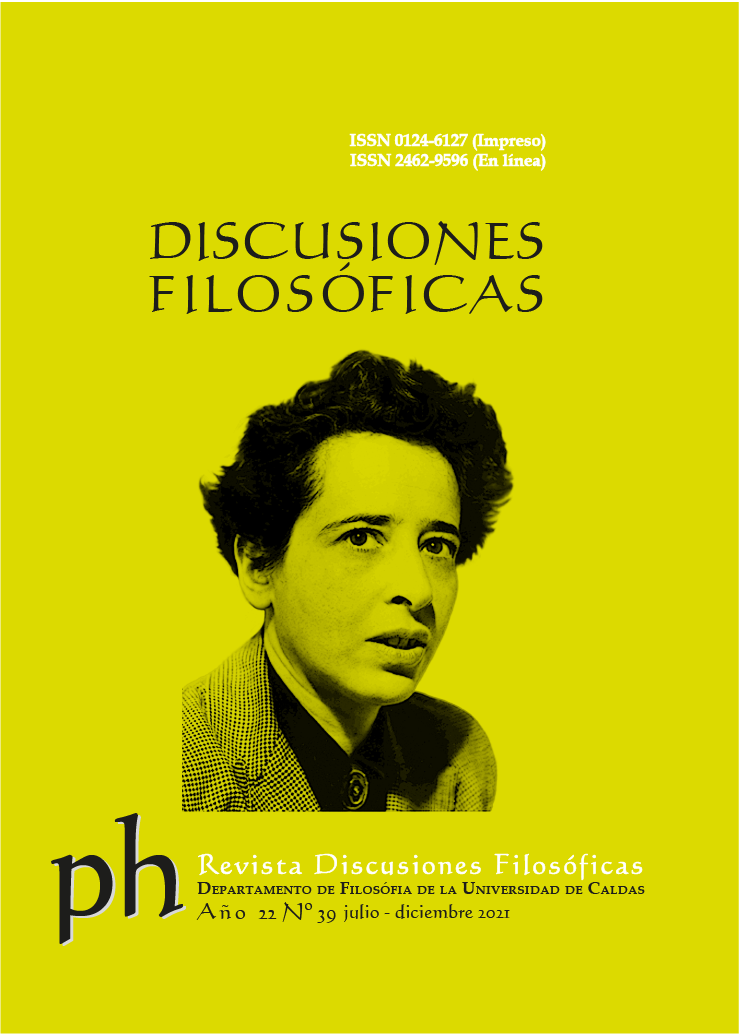Autores/as
Resumen
El problema sobre el método en filosofía ha traído diversas discusiones, en gran parte porque a partir de lo que se asuma como este se puede clasificar un trabajo o escrito como filosófico o no. En el siglo pasado se publicaron unas obras que suscitaron gran discusión justamente invocando ese asunto, de si eran filosóficas o no, en virtud del método empleado en ellas. Me refiero a las obras de Hannah Arendt. En lo que sigue, quiero volver a hacer sonar,
de forma breve, algunas de las voces que han participado en esas discusiones y aportar con mi análisis sobre lo que podemos percibir como la metodología en Arendt. Creo que esto puede ser relevante para enriquecer las conversaciones ya existentes sobre los modos de decir y de hacer en filosofía y las aperturas a nuevas formas de decir y de hacer.
Palabras clave
Citas
Abensour, Miguel. Para una filosofía política crítica. Iztapalapa, 2007. Impreso.
Arendt, Hannah. Thinking Without a Banister: Essays in Understanding 1953-1975. New York: Schocken Books, 2018. Print.
Between Past and Future. New York: Penguin Group, 2006. Print.
Essays in Understanding. Ed. Jerome Kohn. New York: Schocken Books, 1994. Print.
The Life of the Mind. New York: Harcourt, 1978. Print.
The Origins of Totalitarianism. New York: Hardcourt, 1968. Print.
Thinkink Without a Banister. New York: Schocken Books, 2018. Print.
“Capítulo I: el sentido de la política”. Birulés, Fina. Qué es la política. Barcelona: Paidós, 1997. 76-99. Impreso.
Sobre la Revolución. Madrid: Alianza , 2004. Impreso.
La Condición Humana. Bogotá: Paidós Surcos, 2012. Impreso.
Qué es la política. Barcelona: Paidós, 1997b. Impreso.
Lectures on Kant’s Political Philosophy. United States of America: The University of Chicago Press, 1992. Print.
Qué es la política. Barcelona: Paidós, 1997. Impreso.
“La brecha entre pasado y futuro”. Arendt, Hanna. De la historia a la acción. Buenos Aires: Paidós, 2005. 75-88. Impreso.
Diarios Filosóficos. Barcelona: Herder, 2002. Impreso.
On Revolution. England: Penguin Books, 1965. Print.
The Human Condition. Chicago: The University of Chicago Press, 1958.
Baehr, Peter & Wells, Gordon. “Debating Totalitarianism: An exchange of letters between Hannah Arendt and Eric Voegelin”. History and Theory. Vol. 51, No. 3 (October 2012), pp. 364-380. Stable URL: https://www.jstor.org/stable/23277659 Accessed: 23-04-2019 11:48 UTC
Benhabib, Seyla. “La paria y su sombra: Sobre la invisibilidad de las mujeres en la filosofía política de Hannah Arendt”. Cruz, Manuel. El siglo de Hannah Arendt. Barcelona: Paidós, 2006. 15-36. Impreso.
Bernstein, Richard J. “Hannah Arendt’s Zionism?” Aschheim, Steven E. Hannah Arendt in Jerusalem. California: University of California Press, 2001. 194-204. Print.
Birulés, Fina. “Contingency, History and Narration in Hannah Arendt”. HannahArendt.net, 5(1) (2009): 1-11. Web. http://www.hannaharendt.net/index.php/han/article/view/149
“El Totalitarismo, una realidad que desafía la comprensión”. Cruz, Manuel. El siglo de Hannah Arendt. Barcelona: Paidos, 2006. 37-62. Impreso.
Una herencia sin testamento. Barcelona: Herder, 2007. Impreso.
Entreactos. Madrid: Katz Editores, 2015. Impreso.
Bresler, Joe. Follow the dinking gourd. 2008. 28 de octubre de 2018. Web.
Buckler, Steve. Hannah Arendt and Political Theory. Edinburg: Edinburgh University Press, 2011. Print.
Disch, Lisa. “Más verdadero que los hechos: Storytelling como comprensión crítica en los escritos de Hannah Arendt”. Taula, quaderns de pensament 43, 2011: 77-104. Web. http://ibdigital.uib.es/greenstone/sites/localsite/collect/taula/index/assoc/Taula_20/11v043p0/77.dir/Taula_2011v043p077.pdfDi Pego, Anabela. “La comprensión como
perspectiva metodológica en Hannah Arendt”. Andamios, 2016: 61-83. Web. http://www.scielo.org.mx/scielo.php?script=sci_arttext&pid=S1870-00632016000200061&lng=es&nrm=iso>. ISSN 1870-0063.
Herzog, Annabel. “Reporting and Storytelling: Eichmann in Jerusalem as Policital Testimony”. Thesis Eleven, 2002: 83-98. Web. doi:10.1177/0725513602069001006.
Kohn, Jerome. “Introduction”. Arendt, Hannah. Essays in Understanding. New York: Schocken Books, 1994. Print.
“Introduction”. Arendt, Hannah. Between Past and Future. New York: Penguin Classics, 2006. VII-XXII. Print.
Libovici, Martine. «Arendt’s Rahel Varnhanen: A New Kind of Narration in the Impasses of German-Jewish Assimilation and “Existenzphilosophie”». Social Research (2007): 903-922. Web. Stable URL: https://www.jstor.org/stable/40972130 Accessed: 12-04-2019 17:07 UTC
Muñoz Sánchez, María Teresa. “Validez ejemplar y comunidades de certezasKant, Arendt, Wittgenstein sobre el poder de juzgar críticamente”. Web. Isegoría, n.º 57, diciembre de 2017, pp. 505-31, doi:10.3989/isegoria.2017.057.05.
Shklar, Judith. “Rethinking the Past”. Social Research (1977): 80-90. Web. Stable URL: https://www.jstor.org/stable/40970272. Accessed: 09-04-2019 16:23 UTC.
Voegelin, Eric. “The origins of Totalitarianism”. The Review of Politics (1953): 68-76. Web. Stable URL: https://www.jstor.org/stable/1404747. Accessed: 23-04-2019 13:35 UTC
Vollrath, Ernest & Fantel, Hans. “Hannah Arendt and the Method of Political Thinking”. Social Research (1977): 160-182. Web. Stable URL: https://www.jstor.org/stable/40970278. Accessed: 29-01-2019 19:45 UTC.
Young-Bruehl, Elisabeth. “Hannah Arendt’s Storytelling”. Social Research (1977): 183-190. Web. Stable URL: https://www.jstor.org/stable/40970279 Accessed: 09-04-2019 16:10 UTC.
Zerilli, Linda. «“We Feel Our Freedom”: Imagination and Judgment in the Though of Hannah Arendt». Political Theory (2005): 158-188. Web. Stable URL: https://www.jstor.org/stable/30038411. Accessed: 12-04-2019 17:09 UTC.

 PDF
PDF
 FLIP
FLIP


























